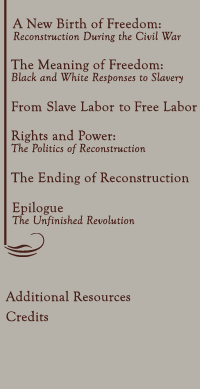




The North's Retreat
Despite the Grant administration's effective response to Klan terrorism, the North's commitment to Reconstruction waned during the 1870s. Many Radical leaders passed from the scene, their place taken by politicians less committed to the ideal of equal rights for black citizens. Many Northerners felt the South should be able to solve its own problems without constant interference from the North.
In 1872, a group of Republicans alienated by corruption within the Grant administration bolted the party. These Liberal Republicans nominated New York editor Horace Greeley for president, and he was endorsed by the Democrats. Greeley's campaign stressed that the South would prosper under "local self-government," with the "best men" (traditional white leaders) restored to power.
Despite Grant's reelection, Northerners were growing tired of Reconstruction, a reaction accelerated when a depression began in 1873, pushing economic issues to the forefront of politics instead of sectional ones. Racism, which had waned in the aftermath of the Civil War, now reasserted itself. Influential Northern newspapers portrayed Southern blacks not as upstanding citizens but as little more than unbridled animals, incapable of taking part in government.
When, in 1874 and 1875, anti-Reconstruction violence again reared its head in the South, few Northerners believed the federal government should intervene to suppress it.
Copyright
2003